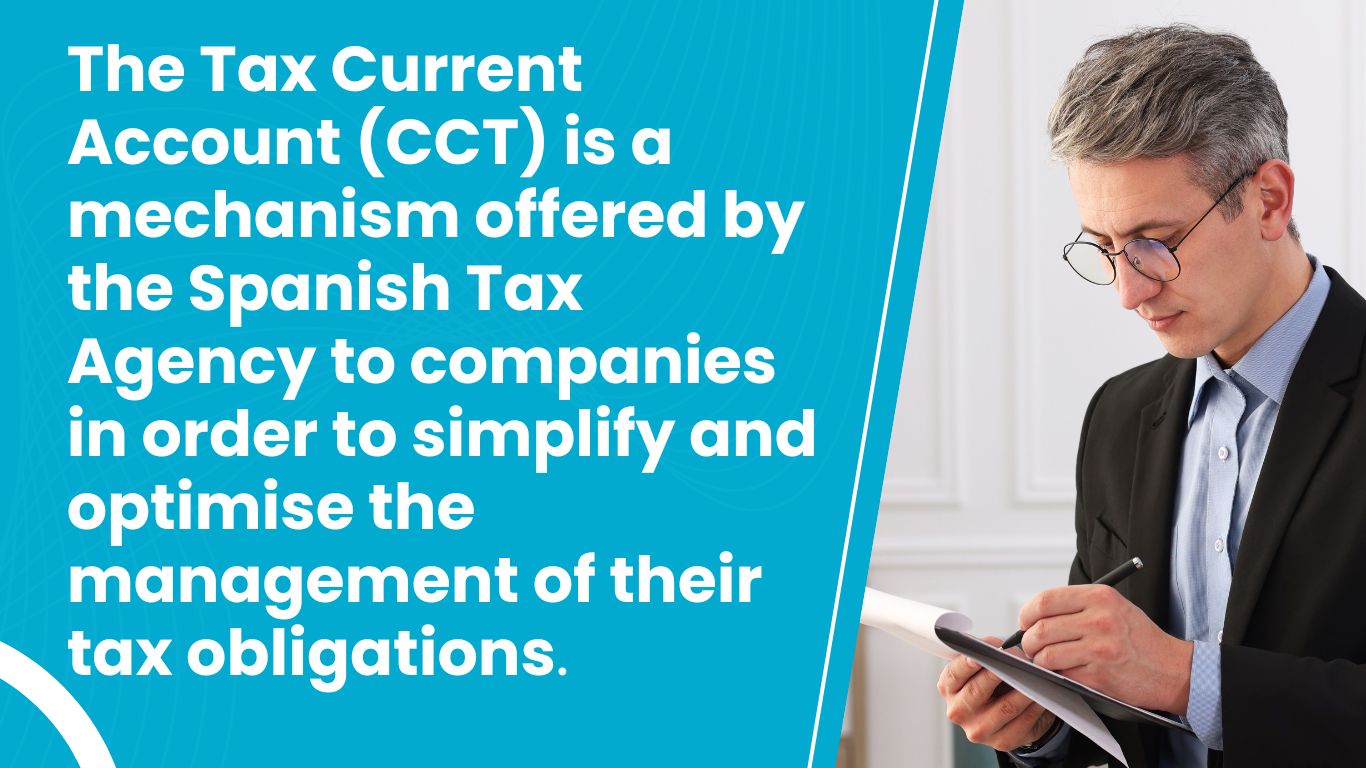The Tax Current Account (CCT) is a mechanism offered by the Spanish Tax Agency to companies in order to simplify and optimise the management of their tax obligations. During October 2025, businesses interested in this regime may apply for inclusion, which will become effective from the 2026 fiscal year.
This system allows companies to offset positive and negative balances resulting from VAT, Corporate Income Tax, withholdings and advance payments, by filing a single quarterly settlement for the net balance.
Below, we provide a detailed explanation of how it works, its requirements, financial and operational advantages, as well as the key aspects to consider when deciding whether this system is suitable for your company.
What is the Tax Current Account (CCT)?
The Tax Current Account operates in a similar way to a bank current account, but applied to taxation. Instead of making payments or requesting refunds separately for each tax return, companies may consolidate all amounts into a single quarterly balance.
Thus, if in the same quarter a company records:
- Returns with an amount payable, and
- Returns with an amount refundable,
the Tax Agency calculates the net balance, and only this difference is settled.
This model offers an integrated view of tax obligations, providing clarity and enabling better corporate cash flow management.
Application period for CCT in 2026
Applications for inclusion in this regime must be submitted only during October 2025. Once accepted, the CCT will apply from 1 January 2026 and will remain in force until the company voluntarily withdraws or is excluded by the Tax Agency.
It is important to note that if the company does not apply in October, it will have to wait until the same month of the following year to request inclusion.
Requirements to opt for the Tax Current Account
Not every company can apply for the CCT system. The Tax Agency establishes specific eligibility conditions that must be met:
- Be up to date with all tax obligations at the time of application.
- In the reference year (2024), the amount of refunds collected or recognised must represent at least 40% of the total amount of returns payable filed.
- The company must not have renounced or been excluded from the CCT system either in the year of application (2025) or the previous year (2024).
- Timely and accurate filing of all self-assessments and tax obligations.
Which taxes are included in the CCT?
The CCT covers various tax returns, both periodic and annual, provided they correspond to the same period of accrual. These include:
- VAT (Value Added Tax).
- Corporate Income Tax.
- Corporate Income Tax instalment payments.
- Withholdings and advance payments (on employees, professionals, and landlords).
This system is particularly useful for companies that regularly have returns with both payable and refundable balances.
Financial advantages of the Tax Current Account
The main advantage of the CCT is its positive impact on liquidity and financial planning:
- Immediate balance offsetting: eliminates situations in which a company has to pay one tax liability while awaiting the refund of another.
- Single quarterly settlement: administrative simplification by consolidating all tax obligations.
- Improved cash flow management: by deferring payments until the quarterly settlement, companies achieve financial savings.
- Particularly beneficial for large enterprises and consolidated groups: especially relevant for companies with an annual turnover exceeding €6,010,121.04, which are obliged to file monthly returns or are subject to the REDEME (Monthly VAT Refund Scheme).
Practical example of how the CCT works
Let us consider a company that, in a given quarter, declares:
- VAT payable: €50,000
- Withholdings refundable: €20,000
- Corporate Income Tax instalments refundable: €10,000
Without the CCT, the company would need to pay €50,000 within the deadline and wait for the Tax Agency to refund the €30,000 later.
With the Tax Current Account, the offsetting is carried out directly:
- €50,000 – €30,000 = €20,000 payable in the quarterly settlement.
This provides an immediate cash flow benefit and avoids unnecessary liquidity outflows.
Limitations and considerations
Although the CCT offers multiple advantages, there are certain aspects to consider before applying:
- The company must maintain strict tax compliance to avoid exclusion.
- Not all refunds are integrated automatically; some may require further verification by the Tax Agency.
- The system requires rigorous monitoring of tax returns to ensure accurate offsetting.
Procedure to apply for the CCT
The application must be made exclusively online via the Tax Agency’s Electronic Headquarters.
The main steps are:
- Access with a digital certificate or Cl@ve PIN.
- Submit the specific application form available during October.
- The Tax Agency will notify the resolution of acceptance or rejection before 31 December.
- In the case of acceptance, the CCT will apply from 1 January 2026.
Is it advisable to opt for the CCT?
The decision to adopt this regime depends on the financial and tax structure of each company. In general, it is advisable for:
- Companies with frequent returns with both payable and refundable balances.
- Large enterprises obliged to file monthly returns.
- Businesses seeking to optimise liquidity and reduce administrative burdens.
Nevertheless, it is recommended to carry out a tailored assessment to determine whether the CCT aligns with the company’s specific circumstances.
Conclusion
The Tax Current Account is an effective tool for companies wishing to simplify tax management and improve cash flow. The application period for 2026 remains open throughout October 2025, offering an opportunity to optimise financial and administrative resources.
A thorough assessment of the requirements, advantages and potential limitations will allow companies to determine whether this system is the most appropriate for their situation.
